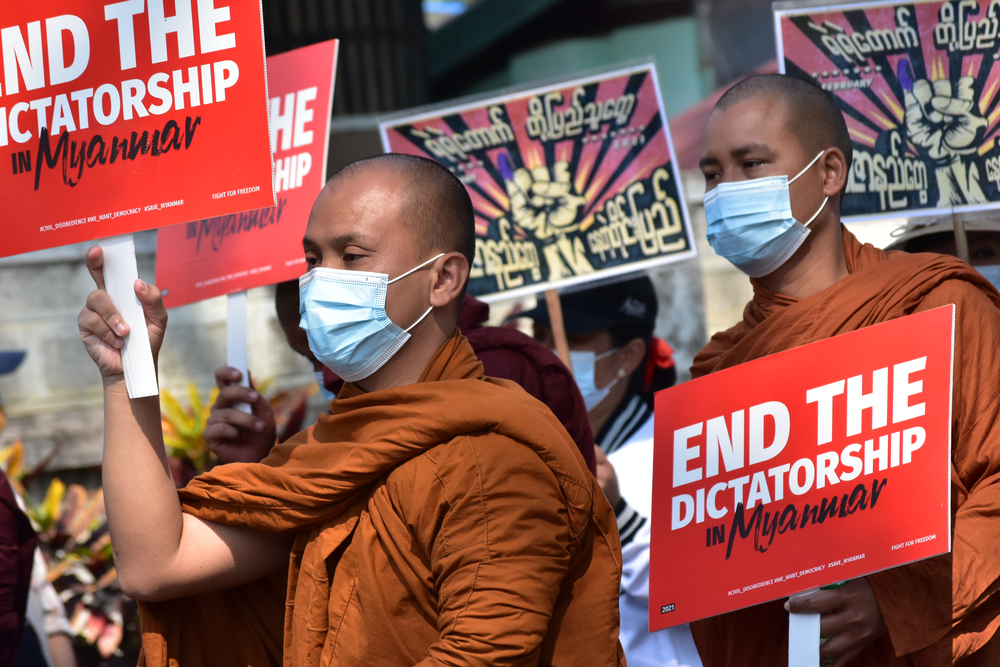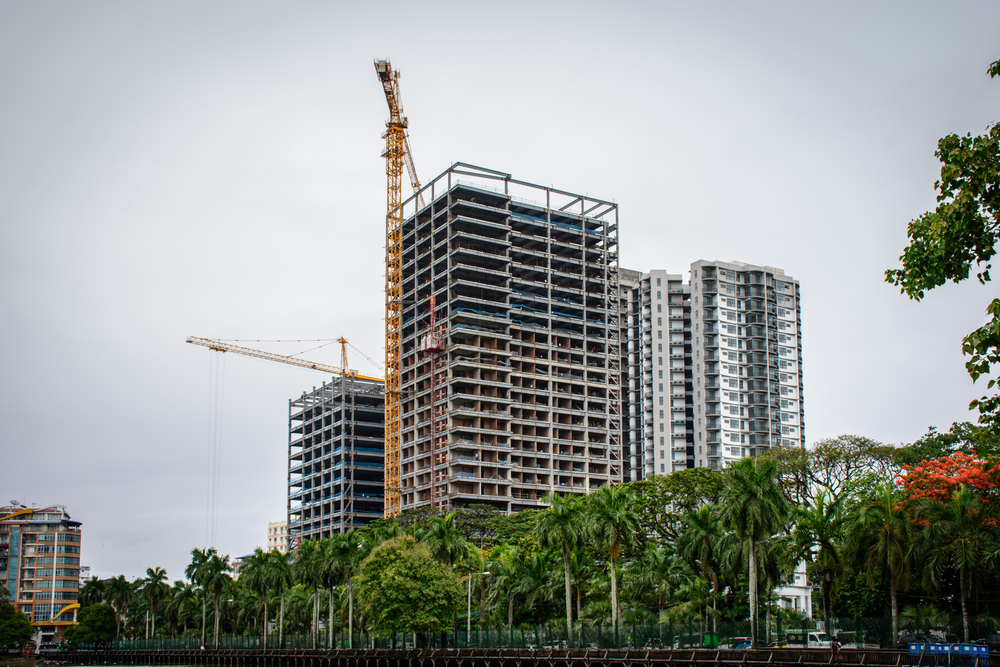A bleak outlook for Myanmar real estate as military seizes control
Real estate sales offices are reopening in Yangon, but banking problems, low confidence, and oversupply mean a bleak outlook as the army seeks to entrench rule

When Myanmar began registering an uptick in Covid-19 cases a year ago, real estate agents and developers in Yangon began virtual sales events on Facebook and Zoom to sell homes and apartments.
Following a decade of democratic and economic reforms, internet usage had soared from just 0.3 percent of the population becoming commonplace everywhere. With faster internet speeds expediating these online events, it looked as though the residential sector had a solid lifeline to cling to.
In the weeks following February’s coup, the military routinely cut internet access across the whole country to stem organized dissent. But economic activity had all but ground to a halt in Yangon anyway. Most shops were shuttered for weeks amid street protests and a violent military crackdown. Strikes spread across different sectors and cities, and construction sites lay dormant as realtors ceased sales.
“If you look around the city, normal life is returning. Many shops have reopened,” says Karlo Pobre, managing director of Colliers International Myanmar in Yangon. “But many sales galleries remain closed.”
Following the military takeover, Myanmar’s economic problems have multiplied with major knock-on effects for real estate. The World Bank and Asian Development Bank forecast a 10 percent retraction in economic activity in Myanmar for 2021, the direst projections on record for the country and by far the worst in East Asia for this year.
Dire news indeed, but it’s a figure deemed optimistic by many independent analysts who have projected the GDP to plummet as much as 20 percent. The recent coup would “irreparably tarnish” Myanmar’s once-promising growth path, according to the Economist Intelligence Unit.
Western governments have piled economic sanctions on the new regime. Some Asian companies have found their ties to Myanmar’s military cause difficulties. A few weeks after the coup, Singapore’s stock exchange suspended shares in developer Emerging Towns and Cities (ETC) over its Golden City commercial and residential development in Yangon which is built on army land.
Anti-military protesters have targeted property developments linked to Myanmar’s military rulers, including the construction site of 68 Residence, a luxury condominium in Yangon, which suffered a bomb attack in June claimed by the Yangon Urban Guerilla Group. No one was hurt in the attack, not least because construction sites in Myanmar have been largely deserted since the military takeover, causing the loss of half a million labourer jobs in the sector, according to the Myanmar Construction Entrepreneurs Association.
Jobs in Myanmar have been obliterated as companies have shuttered and growing numbers of foreign businesspeople have boarded planes and left. A recent survey of hundreds of companies operating in Myanmar by 10 foreign embassies with Japan Valuers Myanmar—a property surveying company based in Yangon—found that 57 percent of large companies suspended activity in the weeks after the coup. And more than 12 percent of Western companies have since terminated their operations altogether.

The most significant problem facing developers and realtors hoping to sell units remains an enduring banking crisis in Myanmar amid restrictions placed on withdrawals by the new military government. The local currency, the kyat, has lost about 20 percent of its value since the coup. ATMs have emptied of cash and customers have had to queue to make an appointment with their bank managers to find out when they might be able to withdraw savings.
There is some [property] sales activity, but I think it might best be described as panic buying. Mostly it’s people who have money in the bank who no longer trust the bank and want a hard asset
“It’s quite unclear when the banking issues will be sorted out, and this will need to be the first step before any kind of normality can return to the sector,” says Shah Suraj Bharat, a senior analyst at Frontier Myanmar Research in Yangon, which publishes Myanmar Real Estate and Construction Monitor.
As confidence in the kyat and local banks have failed, ordinary people in Myanmar have instead placed their trust in gold, cars, the US dollar and, where possible, real estate. These were the same trusted assets from when the military previously ruled Myanmar over half a century before recent reform, says Stuart Deed, executive director of Picon-Deed Property Consultants in Yangon.
“There is some [property] sales activity taking place, but I think it might be best described as panic buying,” adds Deed. “Mostly it’s people who have money in the bank who no longer trust the bank and want a hard asset.”
Residential prices have become difficult to track amid the sharp decline of activity. Analysts say that Yangon was already suffering oversupply and depressed prices before Covid-19 and the ongoing political crisis. The top end of the market saw prices drop about 10.5 percent in less than four months after the coup, says Shah of Frontier Myanmar Research.
According to Japan Valuers Myanmar, ten-percent discounts have become standard as sales activity has resumed in Yangon. But developers are asking for premiums of 10 or 15 percent on sales prices to cover risks associated with receiving large bank transfers, which can’t be withdrawn. Therefore, real prices paid by desperate buyers keen to convert cash assets to property have increased—and security now comes at a premium.
More: Myanmar’s most hallowed colonial building gets new lease on life
“Condominiums located in safer areas with a 24-hour security service are the most important criteria among active buyers,” say the Yangon team at Japan Valuers Myanmar.
The path ahead for Yangon’s notoriously turbulent real estate sector now appears more uncertain than ever. Investors and developers from China, Japan and South Korea are likely to return more quickly than those from the west because they face fewer economic sanctions and are less risk-averse, said Pobre of Colliers. He says that before the coup Asian companies still far outnumbered those from the West. But, according to the analyst, there are few other causes for optimism.
“When I speak to people on the ground—to businesspeople—all of the projections are that it will take two or three years for recovery,” adds Pobre. “Covid-19 has been tough, but business leaders were hopeful because they saw it as temporary. The military coup is entirely different: It has changed the business environment nearly 360 degrees overnight.”
The original version of this article appeared in Issue No. 167 of PropertyGuru Property Report Magazine.
Write to our editors at [email protected].
Recommended
Why everyone is moving to Selangor and Johor: Malaysia’s real estate comeback
Malaysia’s upturn in fortunes is especially prevalent in secondary destinations such as Selangor and Johor
Penang’s silicon boom: How the US-China tech war is supercharging local real estate
Penang’s booming semiconductor industry has created ripples within the local real estate sector
New leader, new opportunities: How Hun Manet is shaking up Cambodia’s real estate game
Hun Manet is overseeing decent economic growth and widening access to the country’s real estate market for foreigners
Singapore embraces inclusive housing reforms amid resilient demand
The Lion City’s regulatory strength continues to exert appeal for international investors








